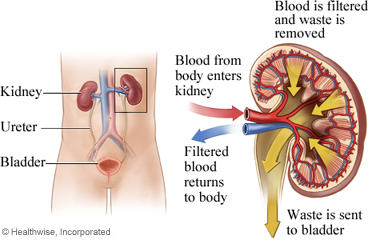
Your Care Instructions
Proteinuria means that you have too much protein in your urine. This is usually caused by a kidney problem.
Your body's blood passes through your kidneys. Normally, the kidneys remove waste from the blood. The waste then leaves the body in the urine. But they don't let protein leave the body. If your kidneys are not working well, they let too much protein get in your urine. A high level of protein in your urine is a sign that something is harming your kidneys.
It may be puzzling to find out that you have a problem with your kidneys, because you probably don't feel different.
Your doctor may do more tests to find out what is causing the protein to get into your urine. Possible causes include an infection or a medical condition, such as diabetes or heart disease. You may need regular urine tests in the future. You may be able to reduce the protein in your urine by getting exercise, eating a healthy diet, and taking medicine.
Follow-up care is a key part of your treatment and safety. Be sure to make and go to all appointments, and call your doctor if you are having problems. It's also a good idea to know your test results and keep a list of the medicines you take.
How can you care for yourself at home?
- Take your medicines exactly as prescribed. Call your doctor if you think you are having a problem with your medicine. You will get more details on the specific medicines your doctor prescribes.
- Work with your doctor and dietitian to set up a diet that will be healthy for you. You may need to:
- Eat a heart-healthy diet to keep the fat (cholesterol) in your blood under control.
- Eat a low-salt diet to keep your blood pressure at normal levels.
- Limit protein in your foods.
- Limit the amount of fluids you drink.
- If you have diabetes, try to keep your blood sugar at normal or near-normal levels.
- Follow your diet. Eat a variety of foods. Spread carbohydrate throughout your meals.
- If your doctor recommends it, get more exercise. Walking is a good choice. Bit by bit, increase the amount you walk every day. Try for at least 30 minutes on most days of the week.
- Check your blood sugar as often as your doctor recommends.
- Do not smoke. Smoking raises your risk of many health problems, including kidney damage. If you need help quitting, talk to your doctor about stop-smoking programs and medicines. These can increase your chances of quitting for good.
- Do not take ibuprofen, naproxen, acetaminophen (Tylenol), or similar medicines, unless your doctor tells you to. These medicines may make kidney problems worse.
- Check with your doctor before you take any herbal supplements or over-the-counter medicines.
Current as of: October 11, 2024
Author: Ignite Healthwise, LLC Staff
Clinical Review Board
All Healthwise education is reviewed by a team that includes physicians, nurses, advanced practitioners, registered dieticians, and other healthcare professionals.

